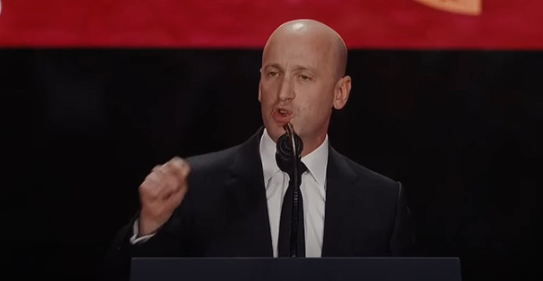Miller is the only senior aide who has maintained a close relationship with Trump after his first term and followed him back to the Oval Office in January this year.
Written by: Dong Jing
Source: Wall Street Journal
In the power landscape of Trump's second term, one name is drawing increasing attention in Washington—Stephen Miller. As Trump's deputy chief of staff and homeland security advisor, Miller is becoming the chief architect of a plan to reshape America.
On September 29, according to the Financial Times, Stephen Miller, referred to as the "shadow prime minister" by former White House chief strategist Steve Bannon, has become the most powerful unelected bureaucrat in the United States in the political landscape following Trump's return to the White House. Miller is the only senior aide who has maintained a close relationship with Trump after his first term and followed him back to the Oval Office in January this year.

(The image shows Bannon (left) interviewing then-Trump senior advisor Miller on his podcast in February 2016)
Bannon stated that, aside from some national security, financial, and monetary functions, Miller is involved in nearly all domestic policy-making. From the mass arrests of undocumented immigrants to attempts to abolish birthright citizenship, and deploying armed National Guard troops on the streets of Los Angeles, these controversial policies bear his imprint.
Additionally, insiders revealed that Miller not only plays a leading role in immigration and security policy but is also deeply involved in Trump's attacks on universities, law firms, cultural institutions, and the media. A person familiar with Trump's thinking said, "This is all Stephen orchestrating; he is involved in all these matters."
His influence is manifesting in unprecedented ways. According to former White House national security official Olivia Troye, "This is completely Stephen Miller's moment to shine," as there is "no one left in the White House to counterbalance him." This has led to the introduction of more extreme policies, raising market concerns about the disruptive nature of policies and legal stability.
Critics worry that Miller is using his influence to push a more extreme policy agenda. He has referred to the Democratic Party as a "domestic extremist organization" and discussed suspending personal protective orders—this constitutionally granted due process right. Supporters argue that he represents a government that fully exercises presidential power to implement policies supported by the majority of Americans.
From Outsider to Core Decision-Maker
In 2016, Miller officially joined Trump's first presidential campaign team as a speechwriter.
Bannon recalled, "Stephen and the president had an immediate chemistry; it was a meeting of minds. After Miller joined, the quality of Trump's speeches improved significantly, becoming more substantial and meaningful."
"Charisma can only take you so far; ultimately, you need some well-thought-out policies, and Stephen is the one doing that."
In Trump's first administration, Miller quickly made his mark on immigration policy. He was one of the main architects of the so-called "Muslim travel ban," which imposed entry restrictions on citizens from several Muslim-majority countries.
He also formulated the "zero tolerance" policy, which led to family separations at the U.S.-Mexico border in 2018.

(In 2017, Miller debated with a CNN reporter on U.S. immigration issues, source: video screenshot)
The "Shadow Prime Minister" Returns to Power
After Trump's defeat in the 2020 election, Miller remained loyal, spending four years researching policies that could be implemented upon a return to power.
Despite lacking legal training, he unearthed obscure legal provisions to defend his harsh policy proposals. In 2023, he explained on a conservative podcast how to use the Alien and Sedition Acts of 1798 to carry out mass deportations without due process.
After Trump's victory, Miller was appointed as deputy chief of staff at the White House, quickly demonstrating extensive power to bypass bureaucratic resistance.
White House Press Secretary Karoline Leavitt described Miller in a statement as "one of the longest-serving and most trusted advisors to President Trump in the past decade," adding that Trump "has the utmost confidence in him and his proven leadership abilities."
Miller's return and consolidation of power did not surprise many former colleagues. Former national security official Olivia Troye stated:
"I always knew that if Trump returned to the White House, it would be Stephen Miller's show." She believes that due to the lack of checks and balances, many "more extreme things" are happening.
In May of this year, he and Homeland Security Secretary Kristi Noem summoned senior immigration enforcement officials to Washington to reprimand them for their "poor performance" in arresting undocumented immigrants.
Miller set a quota of 3,000 daily arrests at the meeting, tripling the average level from the months before Trump's second term. Subsequently, videos of immigration enforcement officers arresting asylum seekers at court hearings and raiding day laborers in Home Depot parking lots went viral online.
When protests erupted in Los Angeles over immigration enforcement, Miller declared on social media platform X that the city had become "occupied territory," stating, "We have been saying for years that this is a battle to save civilization. Now those with eyes can see."
This month, at a memorial for conservative activist Charlie Kirk, Miller issued a stern warning to the left, whom he believes are behind assassination events: "You have no idea what kind of dragon you have awakened."

(Miller speaking at Charlie Kirk's memorial, source: video screenshot)
Analysts believe this statement is not an isolated remark but the latest signal of his push for a radical agenda.
Legal Controversies of Radical Policies
Critics argue that Miller is a divisive figure who has led some of the most legally controversial policies of the Trump administration.
However, some former colleagues say that many of the policies he pushed, including cracking down on illegal immigration, attacking woke culture, and elite universities, are more popular than his opponents realize.
A former colleague from Trump's first term in the White House said:
"He has an incredible ability to interpret certain things and understand how the broader American electorate will respond. Attacks on elite institutions, for example, actually perform well in bipartisan polls."
Additionally, Miller is known for his "results-oriented" approach, often bypassing the normal policy-making process.
A former official who dealt with him during Trump's first term stated that Miller would avoid involving lawyers and stakeholders in the review process to ensure proposals were legal and compliant.
"Stephen is bolder—he doesn't want to wait for those things. He would say, 'No, we're doing this now.' This is still his way of working."
However, this approach has also brought him numerous legal challenges. Skye Perryman, head of the nonprofit Democracy Forward, pointed out:
"We see extremism and overreach, including suggesting that the government need not comply with court orders or weaponizing people's constitutional rights against them, all bearing a lot of Stephen Miller's fingerprints."
According to statistics from the nonpartisan Congressional Research Service, federal courts issued 25 nationwide injunctions against the federal government in the first 100 days of Trump's second term, compared to only 4 during the Biden administration. Perryman believes:
"It is not surprising that the Trump administration lost in court; they seem to have let a non-lawyer dominate their legal strategy."
免责声明:本文章仅代表作者个人观点,不代表本平台的立场和观点。本文章仅供信息分享,不构成对任何人的任何投资建议。用户与作者之间的任何争议,与本平台无关。如网页中刊载的文章或图片涉及侵权,请提供相关的权利证明和身份证明发送邮件到support@aicoin.com,本平台相关工作人员将会进行核查。



